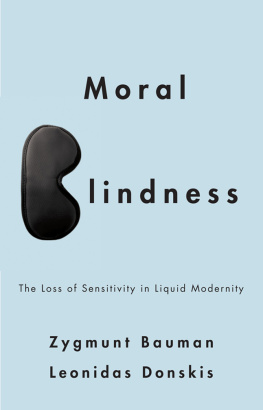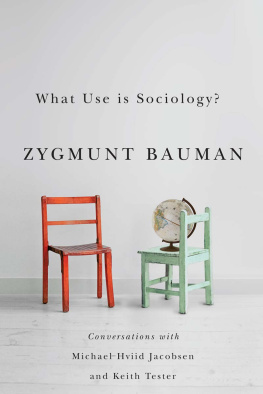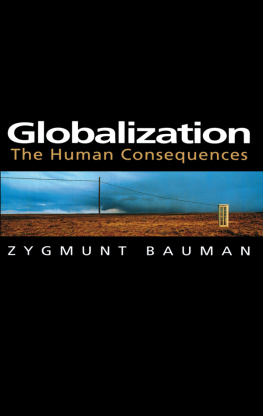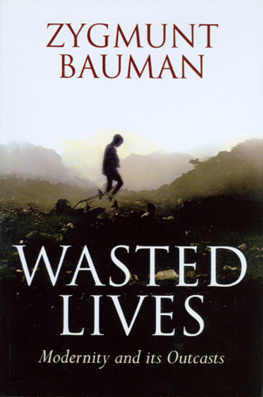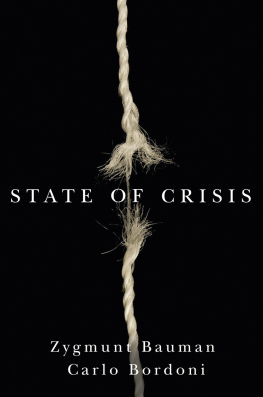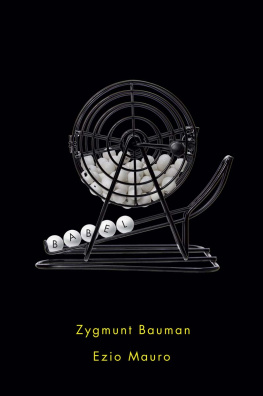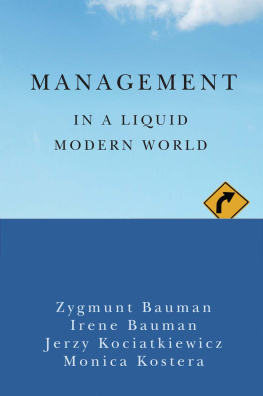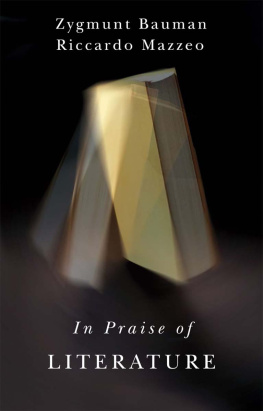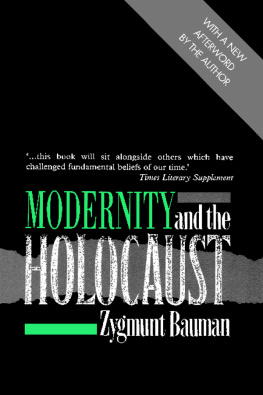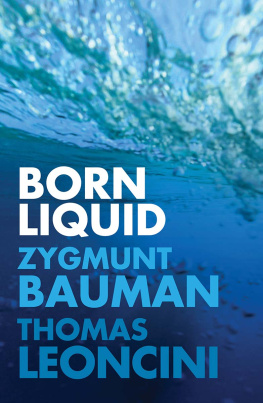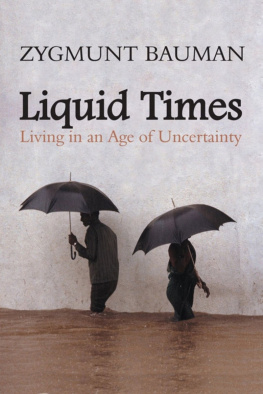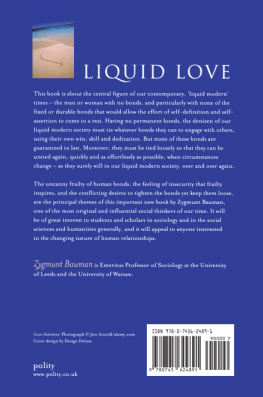The right of Zygmunt Bauman and Leonidas Donskis to be identified as Authors of this Work has been asserted in accordance with the UK Copyright, Designs and Patents Act 1988.
All rights reserved. Except for the quotation of short passages for the purpose of criticism and review, no part of this publication may be reproduced, stored in a retrieval system, or transmitted, in any form or by any means, electronic, mechanical, photocopying, recording or otherwise, without the prior permission of the publisher.
A catalogue record for this book is available from the British Library.
The publisher has used its best endeavours to ensure that the URLs for external websites referred to in this book are correct and active at the time of going to press. However, the publisher has no responsibility for the websites and can make no guarantee that a site will remain live or that the content is or will remain appropriate.
Every effort has been made to trace all copyright holders, but if any have been inadvertently overlooked the publisher will be pleased to include any necessary credits in any subsequent reprint or edition.
Introduction
Towards a Theory of Human Secrecy and Unfathomability, or Exposing Elusive Forms of Evil
Leonidas Donskis Zygmunt Bauman is not a typical sociologist. He is a philosopher of everyday life. His fabric of thought and language weaves together a diversity of strands: high theory; dreams and political visions; the anxiety and torments of that statistical unit of humanity, the little man or woman; astute criticism sharp as a razor and merciless to boot of the worlds powerful; and a sociological analysis of their tiresome ideas, their vanity, their unbridled quest for attention and popularity, and their insensitivity and self-deception.
Little wonder: Baumans sociology is above all a sociology of the imagination, of feelings, of human relations love, friendship, despair, indifference, insensitivity and of intimate experience. Moving easily from one discourse to another has become a signal feature of his thinking.
He is perhaps the worlds only sociologist (and Bauman is one of that fields living greats, along with Anthony Giddens and Ulrich Beck) and one of the worlds great thinkers simpliciter (along with Umberto Eco, Giorgio Agamben, Michel Serres, Jrgen Habermas) who not only actively uses the language of high theory but agilely jumps from this language to that of advertising, commercials, SMS messages, the mantras of motivational speakers and business gurus, clichs, and Facebook comments; then comes back again to the language (and themes) of social theory, modern literature, and classics of philosophy.
His is a sociology aiming to reconstruct all layers of reality and to make its universal language accessible to all types of reader, not just the academic specialist. Its discursive power and ability to decipher reality performs that function of philosophy that Andr Glucksmann likens to the title cards in silent movies, cards that help both to construct and to reveal the reality depicted.
Bauman is an admitted methodological eclecticist: empathy and sensitivity are much more important to him than methodological or theoretical purity. Determined to walk the tightrope across the abyss separating high theory and TV reality shows, philosophy and political speeches, and religious thought and commercials, he understands well how comically isolated and one-sided he would appear if he tried to explain our world in the words of its political and financial elite or using only hermetical and esoteric academic texts.
He learned his theory and was most influenced, first, by Antonio Gramsci and later largely by Georg Simmel not so much by his theory of conflict as his conception of the mental life ( Geistesleben ) and his Lebensphilosophie . It was this philosophy of life of the Germans again, not so much Friedrich Nietzsches as Ludwig Klagess and Eduard Sprangers (particularly his conception of the Lebensformen ) that supplied Bauman with many of his theoretical themes and forms of theorizing.
It is enough to recall Simmels essay Die Grosstdte und das Geistesleben (The metropolis and mental life, 1903): this later found an echo in Thomas Manns essay Lbeck als geistige Lebensform (Lbeck as a spiritual way of life, 1926); still later, in Lithuanian letters, it turned into Tomas Venclova and Czesaw Mioszs epistolary dialogue Vilnius kaip dvasinio gyvenimo forma (Vilnius as a spiritual way of life, 1978). A city becomes a form of life and thought, something in which history, architecture, music, the plastic arts, power, memory, exchanges, encounters between people and ideas, dissonances, finances, politics, books, and creeds all speak out a space where the modern world is born and also acquires its forms for its future. This motif permeates many of Baumans later works.
On the map of Baumans thought we find not only the philosophical and sociological ideas of Gramsci and Simmel but also the ethical insights of his beloved philosopher Emmanuel Levinas, born and raised in Kaunas and also, according to Bauman, the greatest ethicist of the twentieth century. Levinass insights concern the miracle of recognizing the Others personality and dignity even to the point of saving his life without at the same time being able to explain the cause of this recognition, since such an explanation would destroy this miracle of morality and of the ethical tie. Baumans books refer not only to these and other modern thinkers but to theologians, religious thinkers, and works of fiction as well, with the latter especially playing an important role in his creativity.
Just like the Polish sociologist Jerzy Szacki, Bauman was heavily if not decisively influenced by Stanisaw Ossowski, his professor at the University of Warsaw. In receiving, from the king of Spain, the Prince of Asturias Award for notable achievements in the humanities, Bauman in his speech recalled what Ossowski had taught him first and foremost: namely, that sociology belongs to the humanities. Bauman then went on to say that sociology is an account of human experience just as a novel is. And the greatest novel of all time is, he acknowledged, Miguel de Cervantess Don Quixote .
If Vytautas Kavolis held sociology and the social sciences in general to be a field bereft of melody, then Bauman is a counter-example to this: his sociology not only emits sounds but also looks you straight in the eye. This gaze is an ethical one: you cant turn away your eyes and fail to reply, because unlike a psychologically exploring look or one that absorbs (consumes) objects in its environment, the Baumanian look incorporates the principle of an ethical mirror. What comes back to you are all your activities, your language, and everything you said or did without thinking but only safely imitating: all your unreflected upon but silently endorsed evil.
Baumans theoretical sensitivity and empathy may be likened to a way of speaking, an attitude that eliminates the prior asymmetry between the looker and the looked at. Its like Jan Vermeers Girl with a Pearl Earring , overwhelming us by unexpectedly giving back to us our own gaze and leaving us voicelessly wondering: who is looking at whom? We at her, hanging along with many other immortal masterpieces of Dutch art at the Mauritshuis gallery in The Hague, or she at us? The gazed-at gazes at the gazer, thereby returning to the world all the forgotten dialogue. It is a dignified and silent gaze between equals instead of that boundless consuming, using, knowing, and aggressively indoctrinating that we get back in the guise of an alleged dialogue.

